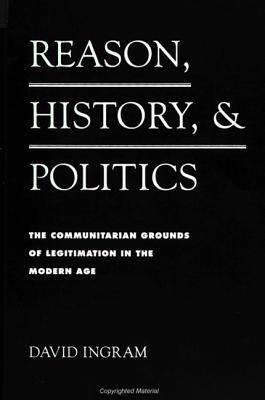
- Retrait gratuit dans votre magasin Club
- 7.000.000 titres dans notre catalogue
- Payer en toute sécurité
- Toujours un magasin près de chez vous
- Retrait gratuit dans votre magasin Club
- 7.000.0000 titres dans notre catalogue
- Payer en toute sécurité
- Toujours un magasin près de chez vous
Reason, History, and Politics
The Communitarian Grounds of Legitimation in the Modern Age
David IngramDescription
The author shows that conceptions of rationality in current theories of science and law can account for neither the legitimacy of paradigm shifts nor the communitarian integrity internal to paradigms generally. He proposes an alternative conception of rationality that does.
Reason, History, and Politics shows that certain conceptions of rationality in current theories of science, technology, and law can account for neither the legitimacy of paradigm shifts nor the communitarian integrity of rational decision and learning internal to paradigms generally. Ingram proposes an alternative conception of reality that does.
Drawing on a rich literature that encompasses classical German Idealism, pragmatism, poststructuralism, and hermeneutics, Ingram shows how a specific model of art criticism and aesthetic judgment illuminates the kind of discursive rationality found in all domains of rational undertaking. The book synthesizes debates in law, political science, philosophy of science and history, and social philosophy, and covers Anglo-American, French, and German schools of philosophy, discussing topics such as critical legal studies, the logic of scientific discovery and explanation, and subjectivity, hegemony, and totalitarianism.
Spécifications
Parties prenantes
- Auteur(s) :
- Editeur:
Contenu
- Nombre de pages :
- 467
- Langue:
- Anglais
- Collection :
Caractéristiques
- EAN:
- 9780791423493
- Date de parution :
- 30-03-95
- Format:
- Livre relié
- Format numérique:
- Genaaid
- Dimensions :
- 152 mm x 229 mm
- Poids :
- 798 g

Les avis
Nous publions uniquement les avis qui respectent les conditions requises. Consultez nos conditions pour les avis.






